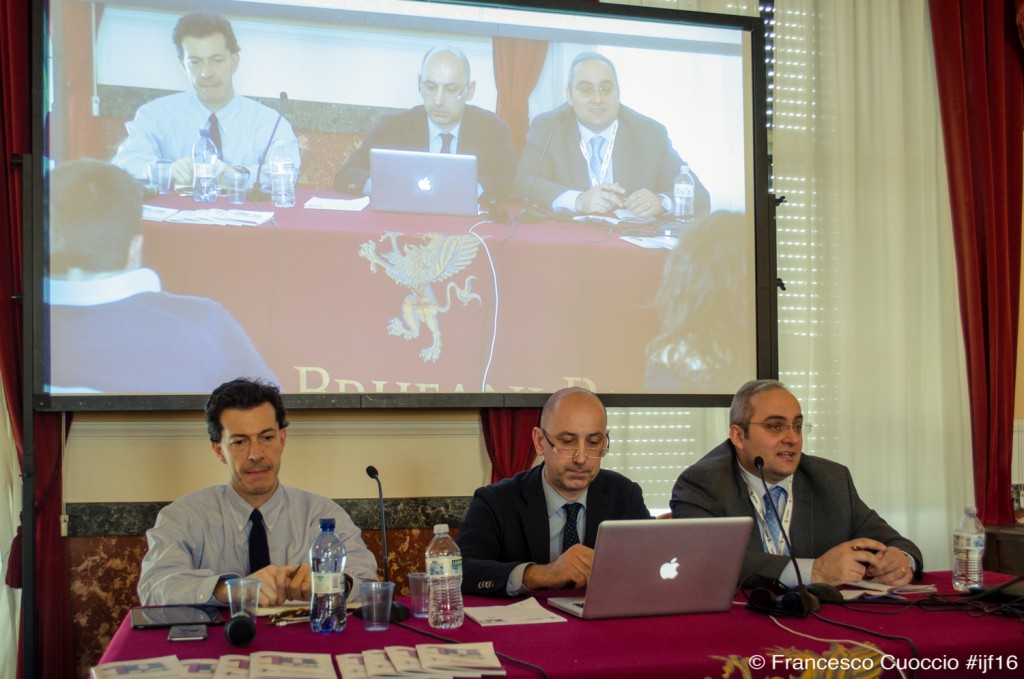
Trying to resist cyber-attacks from skilled hacker groups is impossible.
At least that is according to Professor Marcello Bergonzi Perrone, lawyer and writer for the magazine Cyberspace and Law, who spoke at the International Journalism Festival on 6 April 2016.
Matteo Jori, Professor in Information Technology Law, and Pierluigi Perri, Associate Research Professor in Advanced Computer Law, both at the University of Milan, joined Bergonzi Perrone at the panel discussion “Democracy and surveillance in the post-Snowden era”.
The panellists addressed the problems average computer users and media professionals have in ensuring the protection of their personal and sources’ data, due to the lack of education on such matters.
While the three concluded that complete protection from cyber attacks is ultimately impossible to achieve, especially if individuals are targeted by highly skilled hackers with access to big budgets, they pointed out there are precautions available to protect one’s data.
Professors Bergonzi Perrone, Jori and Perri also discussed the issues of cyber control and the effects secret surveillance has on democracy and the global order.
Seen as a necessary evil within the armoury of governments, “intelligence has historically been used to prevent, rather than address, issues that can lead to conflicting instances,” said Prof. Perri. As every weapon, intelligence is a double-edged sword that can represent a menace to democracy when it is not subject to any regulation.
Quoting Italian philosopher Norberto Bobbio in saying: “The deep reason of secrecy is exactly escaping any possible [source of] control,” Prof. Bergonzi Perrone addressed the issue of when secrecy ought to be employed – e.g. to guarantee national security from domestic or international threats – and when such tactics undermine civil liberties, such as privacy.
Today there is a vast amount of technological tools that allow access to private data. Ignoring the risks related to their improper use, we face a legislative vacuum on matters of personal security and cyber violations. Hence, it is paramount to establish a legal framework for intelligence professionals to follow.
To further highlight the importance of creating such important protection tools, the panellists then discussed three instances of personal privacy breaches that have dominated global headlines over the past few years.
Starting off with the NSA scandal sparked by the revelations made by Edward Snowden in 2013, the speakers analysed the ethical motivations behind the whistleblower’s decision to unveil the existence of the PRISM programme.
Undertaken by the United States, PRISM allegedly granted the NSA access to a massive amount of personal data made available by tapping into the servers of major online companies – including Facebook, Google, and Microsoft.
Snowden contacted journalists at The Guardian and provided these information in order “to safeguard the democratic order,” Prof. Bergonzi Perrone said during the panel.
“Snowden’s case has led to a public outcry against these types of [surveillance] programmes,” Prof. Perri added.
While many journalists, activists and civil society organisations praised him for his actions, Snowden was forced to flee the US in order to avoid prosecution for theft, “unauthorized communication of national defense information,” and “willful communication of classified communications intelligence information to an unauthorized person,” and he is currently residing in Russia.
“Data collection is especially problematic for those whose professions are bound to secrecy: journalists, lawyers, doctors, etc.” said Prof. Perri: “Secret needs to be total, absolute, and guaranteed in every occasion, whether there is a vested interest for those who listen, or not.”
Guarantees of protection were granted in the second case study presented during the panel: founded by Julian Assange in 2006, WikiLeaks is a website-based non-profit organisation tasked with the publication of sensitive data, news leaks and classified media data provided by anonymous uploaders.
As underlined by Prof. Perri, “the important part about WikiLeaks is that the platform ensures the protection of sources,” and there is no brokering apart from verifying experts to ensure they are trustworthy.
The lack of brokerage allows users’ access to raw materials that can then be freely consulted. This guarantees a certain level of transparency.
However, publishing data online does not automatically mean guaranteeing transparency: in order to achieve the latter, the users needs to be able to understand and use correctly that information: “Users need to learn how to read data, in order for those data to be truly transparent” said Perri.
Moving away from examples of data leaking, the final part of the panel focused on the whistleblowing case of Chelsea Manning – formerly Bradley Manning.
In 2010, Manning provided WikiLeaks with classified documents regarding the US army, including a video titled “Collateral Murder” taken during a military action in 2007. The footage showed the murder of unarmed civilians, who were shot by American soldiers flying on US Apache helicopters.
“These videos can not only help, but also undermine, democratic orders,” said Prof. Perri. He then concluded emphasising the important role journalists and media professionals have in providing understandable analyses of leaked data in order to safeguard the public from “information warfare”.